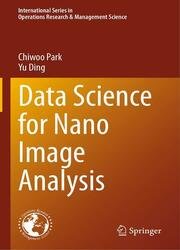 Название: Data Science for Nano Image Analysis Название: Data Science for Nano Image Analysis
Автор: Chiwoo Park, Yu Ding
Издательство: Springer
Год: 2021
Страниц: 376
Язык: английский
Формат: pdf (true)
Размер: 12.0 MB
This book combines two distinctive topics: data science/image analysis and materials science. The purpose of this book is to show what type of nano material problems can be better solved by which set of Data Science methods. The majority of material science research is thus far carried out by domain-specific experts in material engineering, chemistry/chemical engineering, and mechanical & aerospace engineering. The book could benefit materials scientists and manufacturing engineers who were not exposed to systematic data science training while in schools, or data scientists in computer science or statistics disciplines who want to work on material image problems or contribute to materials discovery and optimization.
With the current rapid advancement in the use of Artificial Intelligence (AI) to power scientific discovery, the methods in this book are ideally suited to educate researchers in the benefits of AI for their research and help them with their initial implementation. This book successfully integrates data science with imaging in a way that allows a new practitioner of the methodology to work through concepts established in each field (data science and imaging) without getting bogged down by differing terminologies and complex mathematical concepts. As such, it is an ideal reference for graduate courses in this area and for scientists who maybe many years from graduate school but now wish to enhance their understanding of new methods for image analysis.
Who Should Read This Book:
This book is designed for data scientists who are interested in the application of data science to materials research. It covers the topics of statistics, optimization, image processing, and machine learning applied to image and video data captured in materials research. The contents of the book provide data scientists a comprehensive overview in terms of the challenges and state-of-the-art approaches in image data analysis for nanomaterials research. We expect the readers to have at least basic knowledge in statistics, linear algebra, and optimization. The readers do not need any background in materials research, because the book is largely written from the perspectives of a data scientist.
Materials scientists and practitioners who are interested in Artificial Intelligence and Machine Learning (AI/ML) could also benefit from this book. In the past few years, we witness a fast increasing presence of AI/ML sessions and workshops in major materials research conferences, such as the Materials Research Society (MRS)’s Spring and Fall Meetings and the Microscopy & Microanalysis (M&M) conference. We also noticed that many students from the materials science departments are taking, or have taken, machine learning courses. With the basic knowledge of statistics and Machine Learning, materials scientists can branch out to more advanced topics by using this book, which builds upon examples and case studies taken from materials research. Practitioners can run the algorithms and methods through the code and examples accompanying the book and apply the solutions for their own benefit.
Скачать Data Science for Nano Image Analysis
|